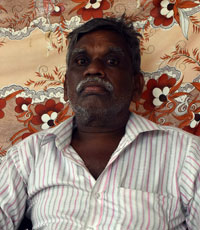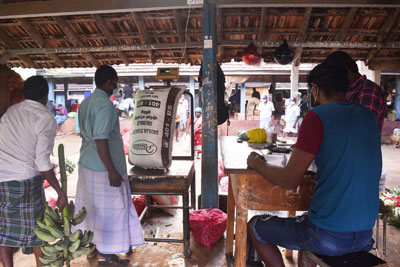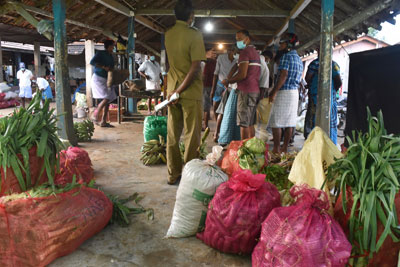News
Jaffna traders squeeze farmers with old Tiger war chest tax
Seasoned Jaffna farmer Subramaniam Kandasamy stopped taking his prized vegetables to the local market because he was broken by the illegal “tax” previously forced on farmers by the separatist Tiger rebels and now exacted by local wholesale traders.
The 68-year-old farmer has looked to other markets, even though they are far away from his farm at Kopay, Jaffna, to escape the unofficial 10 per cent levy and ensure he has a decent profit to support his family of five.

Subramaniam Kandasamy
Nearly three years ago, Mr. Kandasamy began to take most of his red onion, potato and cabbage harvest to the Dambulla Dedicated Economic Centre, almost 250km from Kopay, or sell them at Jaffna collecting points of leading supermarket chains that transport vegetables from the north to other parts of the country.
Despite the war ending 12 years ago, the Tigers’ forced levy is still very much active.
With the rebels gone, wholesale traders in local markets have become the beneficiaries of this unofficial tax, demanding one-tenth of the crop from farmers as a mandatory “discount” on grounds the quality of the produce varied. If farmers refused to pay the discount they would not be able to sell their goods as traders operate collectively inside the market.
“Over the years, it increasingly became more difficult to engage in farming on a large scale as I used to do in the past. Now, labour costs and other farming expenses have increased significantly. I cannot afford to sell at a discount price at local markets, so I prefer sending my vegetables to other markets,” Mr. Kandasamy explained.
He said the increasing overheads had forced him to sell land, reducing his former 40 parappu (400-perch) farm by half over the years.
It is a similar story for M. Shritharan, a farmer from Kuppilan, a rich agrarian village in Valikamam, south of Jaffna, who has suffered the impost since childhood.
“Ultimately, we don’t get a full return on the produce we take to market. We have to pay the tax across all our crops. How can we go on farming with these practices in place and the increasing costs of labour and farm materials?” Mr. Shritharan asked.
Northern farmers said they suffer this decades-long injustice due to inaction by local government bodies, who oversee local markets.
Farmers’ federations across the north have raised the issue for years but no lasting solution has been achieved, merely posters put up in local markets stating the “discount” practice was illegal and should not be encouraged.
At the two major vegetable markets in the north, Chunnakam and Maruthanarmadam, there were no such posters inside the market.
With the local economy battered by the global pandemic since last year, Mr. Shritharan said farmers were under tremendous strain to ensure a decent income for their families.
“We spend months to cultivate crops for the market but these traders make quick bucks within minutes,” he said, disgusted.
The traders’ impost on farmers works simply: when a local farmer takes his crop of 100kg of red onions to any market in the north, 10kg is considered the “mandatory discount” and the farmer is only paid for 90kg.
The farmers also have to pay the government-imposed levy of 4 per cent of the total crop.
In order to collect that levy, the area’s local government body calls for open tenders every year to lease the respective public market complex for the purpose of collecting government taxes and running the market. Usually, the bids are in millions given the returns expected.
The lessor employs staff to weigh produce brought to market to collect the 4 per cent tax. The lessor also gains income from charging parking fees, licence money from traders (traders also pay fees directly to the government).
Farmers are caught by the fact that the weighing of produce to calculate the legal 4 per cent tax and the illegal 10 per cent “tax” is carried out by the same set of people at the markets – the lessor’s employees, who are often family members.
Farmers said anonymously that lessors and traders operated like a virtual mafia against farmers.
A Right To Information (RTI) application filed by the Sunday Times at the Chavakachcheri Urban Council, which oversees the public market in the town, revealed that the winning tender bid for the current year was Rs. 9 million.
The Chairperson of Chavakachcheri Urban Council, Sivamankai Ramanathan, acknowledged the existence of the illegal levy while stressing the council could take action against wholesale traders demanding the discount if farmers lodged complaints against them.
“It has been going on like a secret understanding between the two parties,” she said. “We have instructed farmers and wholesale traders not to engage in this practice any more with notice boards put up inside the market and our officials also deployed to monitor activity. But we haven’t received any complaints yet,” Mrs. Sivamankai said.
The reason why farmers are not willing to come forward and lodge complaints against traders who insist on the unofficial levy is that if they do, they will not be able to sell their products the next time they bring their produce as traders operate as collectively in the market.
“If local bodies take stern action against traders by temporarily suspending their trading permits, these activities can be minimised, but they are not willing to take such steps,” Mr. Shritharan said.

Farmers weigh their cultivation at Kodikaamam market
The wholesale traders do not exact the 10 per cent levy for vegetables they buy from other regional markets such as Dambulla, Colombo, Nuwara Eliya and others.
The President of Federations Farmers Union in Jaffna, Kandaiyah Thiyagalingam, said the forced unofficial tax has forced farmers to look for other regional markets to sell their produce.
“Nowadays, many farmers sell their harvest to regional markets through middlemen just to avoid being charged the levy by local wholesale traders. We have repeatedly taken up this case at every meeting but nothing happened,” Mr. Thiyagalingam said. He too sells his crop of red onions to other regional markets.
According to locals, the 10 per cent levy commenced during the 1970s, through mutual agreement between farmers and traders, with the introduction of a mandatory “discount” on the purchase of edible root vegetables such as carrot, potato, manioc (maravalli), beetroot, palmyra root etc. where loads were weighted down by soil and heavier sacks etc.
In the 1980s, the Tigers extended the levy to cover all crops.
At every Jaffna District Development Committee (DDC) meeting, representatives of farmers federations had taken up the issue but it had been sidelined by other critical issues raised at the meetings.
On February 2, however, at a DDC meeting presided by Governor of the Northern Province, Mrs. P.S.M. Charles, the DDC passed a resolution unanimously to take adequate steps to resolve this issue without delay.
That action came after Jaffna District Secretary K. Mahesan in October last year issued a directive to local authorities to fix the price of vegetable cultivation by quality through public auction in order to prevent traders appropriating 10 per cent of the farmers’ produce as a “discount”.
On March 1, the Regional Assistant Commissioner of Local Government in Jaffna, M. Sulochana, issued a directive to all heads of local bodies such as pradeshiya sabhas and urban councils to take urgent steps to prevent farmers being subjected to the rogue levy at public markets and subject errant traders to the force of the law.
The directive also instructed the officials in local bodies to form a committee consisting of council chairman, the local (4 per cent) income levy official, market supervisor and a representative of the local farmers federation to ensure that the unofficial practice is stopped.
The directive stressed that receipts for agricultural cultivation based on weight be issued after farmers complained that receipts were not given in some markets.
Recalling yesteryears, a farmer described how LTTE cadre in civilian clothes would be deployed in local markets to ensure the imposts were being carried out and how the “unofficial levy” went directly to the separatist outfit for its war chest.
After the war ended in 2009, to circumvent the impost, some local authorities came up with pilot programmes called Uzavar Santhai (Farmers’ Market) where farmers could sell directly to the public without going through middlemen or wholesale traders, but the initiative did not last long.
“You cannot expect farmers to sell their products on their own at market by waiting for hours as most of them work around the clock on their farming activities. It is not reasonable. All we ask is a decent and full price for our vegetables,” Mr. Thiyagalingam said.
Sasitharan Punyamoorthi, a retail vegetable seller at Chavakachcheri market, said many northern farmers did not wish to sort their produce based on quality, as farmers did in other regional markets, because they wanted to gain higher prices for low-quality vegetables by mixing them with good produce.
“They blame us for the discount but if the quality of cultivation is mixed, how can we sell it to customers at a fixed price?” he asked, suggesting that if the farmers’ loads included perishing vegetables the traders would have to sell the whole lot in a single day to not lose money.
Prem Ram, Manager at Keells Vegetable and Fruit Collecting Point in Kopay, said the company bought selected local produce directly from farmersat a higher rate of Rs. 10-30 a kilo above the local market price.
This week, the price of locally cultivated potatoes went down to Rs. 60-75 a kilo but the Keells collection point continues to purchase from local farmers at Rs. 110.

Local levy official appointed by DS monitor farmers weighing their cultivation before fixing the price at Kodikaamam market
“Our top priority is the quality of the cultivation. Depending on availability of seasonal crops, we transport thousands of kilos of local cultivation daily. These days, we purchase more than 800kg of red onions from farmers,” Mr. Ram said, pointing out that Keells has also initiated farmer-empowering projects through seed grants, bank loan facilities and other assistance.


